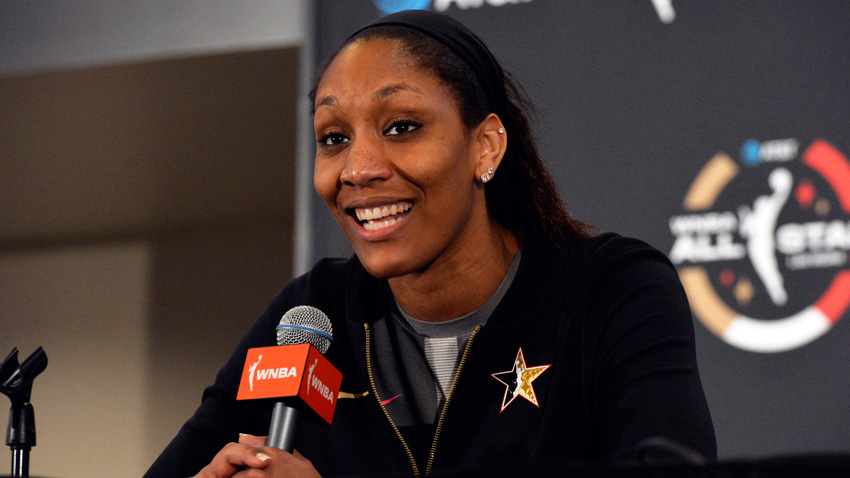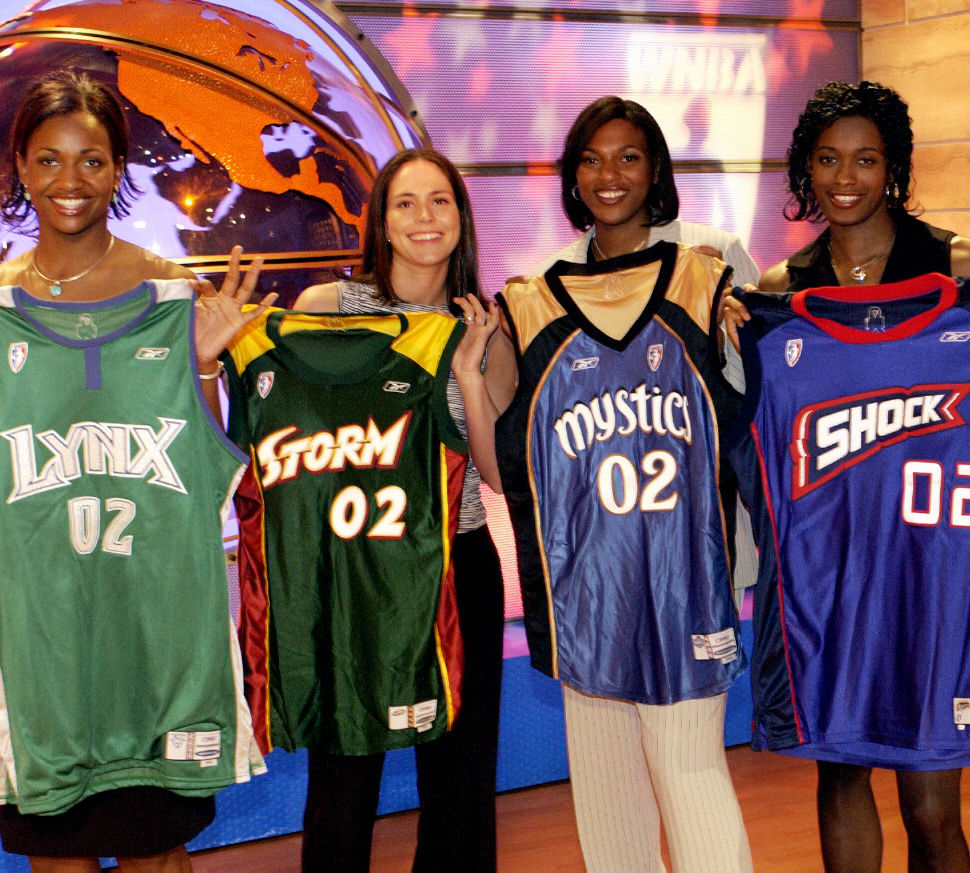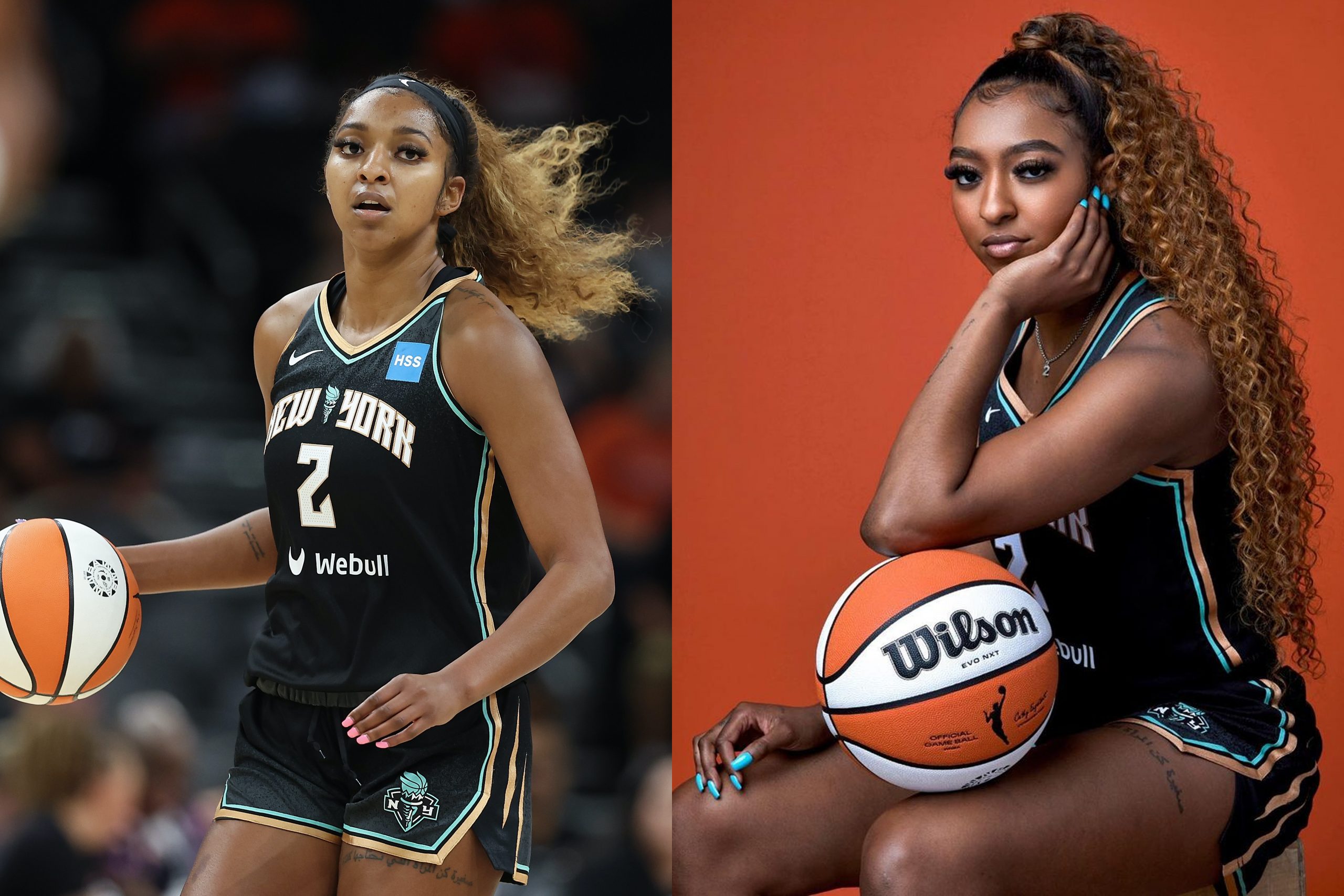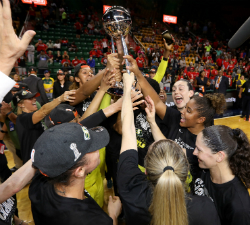Jasmine Thomas on Athletes Ally, LGBTQIA+ Inclusion, & More with Kayce Kirihara

WNBA ambassador Kayce Kirihara sits down with Connecticut Sun guard Jasmine Thomas to talk about her role with Athletes Ally, the misconceptions of the LGBTQIA+ community that still exists to this day, how the ‘W’ has changed throughout her 12 years in the league, and successfully balancing love and basketball.
Kayce Kirihara (KK): Thank you for taking the time to chat with me. So for everyone, I’m here with Jasmine Thomas. Let’s start off with what your pronouns are.
Jasmine Thomas (JT): She/her.
KK: Perfect! So, I saw that you’re an ambassador for Athletes Ally, which is amazing. Can you tell our audience a little bit about what Athletes Ally is and what’s your role?
JT: I mean it’s an organization, that is, you know, doing a lot of the groundwork to try to fight for equality, visibility, protection, safety, healthcare, everything for the LGBTQIA+ Community. And I got connected to them through I think just social media. I’ve seen a lot of players in the league whether it’s Brianna [Turner] from Phoenix, Elizabeth Williams, Sue Bird, like a bunch of people that were already working with them, so I knew about it. They reached out to me on Twitter and shared more with me about what they do and kind of gave me some material to get comfortable talking about the transgender community.
KK: That’s awesome! For everyone learning about the LGBTQIA+ community can you talk about how specific states are imposing bills and laws, excluding transgender youth from participating in sports? And what are some things that you think that we can do to fight them on it, or you can just bring awareness and visibility?
JT: With a lot of things, some states are just making it very difficult for us to protect our children. I think for me that’s where it kind of stands out the most. It’s an attack on our youth, you know their safety, their health, their wellbeing, their development, you know, and I think what we can do is the education piece; there’s a lot of myths and false stereotypes that you know are ignorant. People think they are stating the obvious, but it’s not backed by fact, it’s not backed by science, it’s not backed by any kind of medical credibility, so for us that’s what we’re trying to do. For example, the first thing when you talk about trans people in sports, people say they have an advantage, or you know if it’s the reverse, they would have a disadvantage, but it seems to only be a problem in women’s sports. Their whole thing is like we’re “protecting the integrity of women’s sports”, but you’re actually not. So, I think that’s the role that I’m taking in this whole thing is just letting others know that’s not true, you know there aren’t very many trans women athletes and there hasn’t been a known advantage with them competing so just really kind of emphasizing that. Our kids need to know that there is a safe space for them to be themselves while still playing the sports that they love.
KK: Absolutely, I think that’s true for a lot of things today. A lot of people speak to what they don’t know, without educating themselves and really learning, and I think that’s the key. So how do you think we can amplify LGBTQIA+ equality not only in our government but also in our daily lives?
JT: I mean, the first thing you said when we were talking about what certain states are implementing or not kind of checking… First of all, check with your home state and try to learn what’s going on there, who’s in position, know who your local, state, and federal leaders are, and who we are even putting in office, I think that has been the foundation of all of the kind of social justice stuff we’ve been really getting on board with these last few years. It’s the people making the decisions that we really need to change, you know, so I think that’s always the first step.
KK: Absolutely. So as someone who identifies as bisexual, can you talk a little bit about society’s perception of bi-visibility versus the reality of what it actually is?
JT: I mean there’s just so many things I feel like the biggest thing that I faced was like, “Oh you think maybe it’s just like right now”, or “It’s because you’re in the WNBA”, thinking it’s like a situational or circumstantial thing, instead of it actually being an identity, you know, so I think that’s the biggest thing that I face. Also, people just think that, I don’t know “you’re a whore, you want to just be with everybody”, and I think that’s the biggest misconception. To me it seems simple. I’m attracted to individuals. That’s what bi-visibility is for me. I’m attracted to people as individuals when getting to know them, and I express how I am and who I am, and whomever that attracts I get to know them on a deeper level, and if it turns into something more, it has nothing to do with their genders.
KK: I think that, again, it goes back to like people speaking on what they don’t know or what they’ve never experienced right? People are so quick to judge on what they don’t know. And I think that’s the problem.
JT: It has to make sense to them, you know?
KK: Exactly!
JT: If it doesn’t make sense to them, then it must not be real, ya know?
KK: It’s so close-minded! Like I said, people love to speak on what they don’t know or what they’ve never experienced. Okay, so as for the depth. Okay, so as for the W, how well do you think they do when it comes to being an ally and representing not only the players, but the LGBTQIA+ Community, or what do you think you want to see more from them?
JT: When I think about, what, I’ve been in the league 12 years now, and I think about where it started when I was first coming in, to where it is now I definitely see a lot more conversation, a lot more support. We’re doing things like this education, really talking about it and sharing the stories of the different identities that are within the W, so I think that is definitely a plus and it’s something good that has allowed us to, you know, feel like we can really express ourselves and be ourselves. I will say when it comes to maybe some of the, I don’t know, I have to pick on my teammate, but there was a Sports Illustrated issue with the swimsuits, and it was amazing, it was great, and those women deserved to be on there and it had nothing to do with that, but then my teammate Courtney [Williams] was like, you know there are a lot of people in this league they look like me and dress like me and maybe would have done that feature a little differently. I kind of had to agree. There could have been, you know, a little bit more of a, I guess a masculine portrayal of a swimsuit person on that cover, so that really doesn’t have anything to do with the W but it does in a way, it goes with showing every form of every player in this league.
KK: Yeah I think about representation like that, because everyone looks different you don’t I mean, I think the representation in a feature like that, it’s important to be very inclusive to everybody. I think that’s a great point.
JT: I think sometimes, especially in the W, we get the backlash of being too masculine. Like that’s the stigma or the stereotype about WNBA players is that because we’re all gay, which we’re not, but we’re too masculine or we give off this masculine kind of image that isn’t attractive to sports fans, you know, and I think we still kind of fall into that sometimes and don’t just be ourselves in the media.
KK: So with that, do you think that Sports Illustrated for example, do you think they were trying to overcompensate or try to kind of push that there are also “girly” women that are in the W that represent that, as opposed to like you said, showing the full representation.
JT: I think I’m unsure because I feel like there’s people that were on that cover who, you know we might have seen in whether it’s a pool setting or beach setting that might have actually dressed differently, but they can do both! It’s not trying to be this linear view of saying “oh like because they were on the cover wearing like female swimsuits that’s what they always do”. They can switch it up and do both, and it would have been nice to kind of see some of that in those images.
KK: And I think it would have been a little eye-opener for a lot of people who are very judgmental, you know what I mean? So I’ve seen pictures of you and T [Natisha Hiedeman], and let’s just say GOALS! How did you two meet?
JT: We obviously met in Connecticut at training camp. Yeah I mean that’s pretty much the simple answer. She’s obviously a lot younger than me so for a while it was kind of just like, we were friends, we were playing the same position, we spent a lot of time together, and then off the court, you know how there’s always like little cliques and dynamics within teams. We just spent a lot of time together so that’s really how we met, simple answer.
KK: So not to be too intrusive, but can you talk about how your connection grew, you know being teammates and then like who shot their shot first, and how was that dynamic?
JT: Honestly we kind of crossed that “line” once we went overseas, and I’m not surprised by that! Because when you go overseas you get really lonely. You kind of rely on your little network of people to get you through it to keep you sane and we noticed that we kind of had our bond get stronger once we went overseas. We had planned a trip to Paris on one of the brakes and then that’s when it was like, okay, like we’re planning trips, we’re doing whatever, It’s quietly crossing the line. From there, I would say, maybe I shot my shot first, but I also backpedaled a few times, so I would say she was the most persistent, but I probably put it out there first.
KK: How long have you guys been together?
JT: Three years.
KK: That’s awesome. Could you talk about the duality of being a teammate and partner in one and are there ever days, where you’re like, “dang I got to see that home and at practice”?
JT: I mean like anything you know with any of your relationships you’ll have days where you might be getting on each other’s nerves, or maybe you had a little conflict and confrontation and you do have to kind of see each other all the time. But I think, for the most part it works, because we spend so much time away from each other that we look forward to the time when we’re actually going to be able to see each other every day, have our little routines, cook dinner together and watch TV together. So we enjoy it. We have better times than times with tension. I feel like sometimes people are surprised, maybe because we do play the same position, but we’re different types of players, and we’re also in different points of our career, so I feel like that dynamic helps a little bit. We’re able to kind of lean on each other for things, kind of come to each other, whether it’s like what we see, what we think we could do better, what we need to do more of. Sometimes I guess it does get hard when either one of us is going through our own thing with basketball. Sometimes you gotta find that balance between like constantly talking through it, or just like let’s not talk basketball now, let’s just do something different. I think that’s the beauty of the relationship with the teammate is you have all those different you know things to come back to.
KK: I think it’s awesome! I think you know, like seeing it with Courtney Vandersloot and Allie Quigley and you guys, being teammates, I’m thinking like well, “could I be with somebody that I see at work and at home?” But like you said, I think that you know, having somebody that you trust and that you know is like your confidant and a supportive partner on and off the court, I think it’s amazing. So following up there, what would you say, is the most uniquely blissful, yet challenging part of, and you kind of touched on this, but being in it with your teammate.
JT: I would say the best part is.. Like if I took it off the court anything like good that happens, or anything bad that happens in life in general, she’s the first person I think about, the first person I want to tell, the first person I want to vent to. So when I go do something that has been my whole life, that is so important to me, you know that I work so hard to accomplish, and you know that feeling of just setting goals and accomplishing them, to do it with your best friend is one of the best feelings ever. I always think about winning championships together, being on the court together, we don’t play that many minutes together, so we talked about things like that, and so, for me, that’s the best part. And then I guess the hardest part is overseas. When we have to go our separate ways for that amount of time where you really don’t know when you’re going to see each other, you know it’s not as easy as it seems, so we try to plan around breaks but she has her own things that she has to do with those breaks, I have things I have to do as well. That seven or eight months, not knowing when you’re going to see each other is the hardest thing.
KK: So in the future, would it be ideal that you guys play on the same team overseas?
JT: For me? No (laughs). I would be happy to never go overseas again to play, I think I want to use my off seasons to start doing some other things, like actually building a resume that doesn’t exist right now, you know? I’m just trying to do some stuff off the court and really figure out, you know, in a few years, when I feel like I’m ready to retire, what that transition is going to be, I want to get that going now.
KK: Speaking about life potentially outside of basketball, what do you think that you will be doing or what do you want to do when your career is up?
JT: My educational background is in marketing, but like I said I’ve never actually done it. So I feel like I would love to stay involved with sports. I’d love to do some stuff in NBA front offices. There have been some W players over the last few years in associate programs. I talked to Izzy (Isabelle Harrison) from Dallas and she had the opportunity to spend a couple of weeks in different departments in the front office. So, for me right now that’s like the ideal goal. I would love a chance to kind of be able to network, talk to some people, figure out what I’m really passionate about off the court but definitely stay involved with basketball.
KK: I love seeing all the former players coaching and just kind of being involved in sports whether it’s the NBA or WNBA. I think it’s amazing. The opportunities for former players in those spaces are great, so I would love to and I can’t wait to potentially see you in a front office. Okay, so last question and it’s been a pleasure talking to you, but what is your definition of pride and how do you think we can all represent pride in our lives?
JT: I think my definition of pride is just being unapologetically yourself. You know, it helps other people that are dealing with expressing themselves when you can talk about it and explain it and try to make it make sense. But, if I’m being honest it doesn’t have to make sense to anybody else, but you. If you feel good about who you are, and you know how you’re living and how you’re treating other people, then you should be proud of yourself. That is pride to me.
KK: I love that. Again it’s been so great talking to you. You know from training camp, with the Seattle Storm to see where you’re at right now, I know you’re dealing with an injury right now, but speedy recovery. I just want to say that I’m super proud and it’s been great to watch you grow, so thank you for being the first of this segment, I appreciate it.
JT: Thanks for having me on, I appreciate it too.
Kayce Kirihara can be reached on Twitter at @InfamousKayce. The views on this page do not necessarily reflect the views of the WNBA or its clubs.


,xPosition=.5,yPosition=.5)
,xPosition=.5,yPosition=.5)
,xPosition=.5,yPosition=.5)
,xPosition=.5,yPosition=.5)